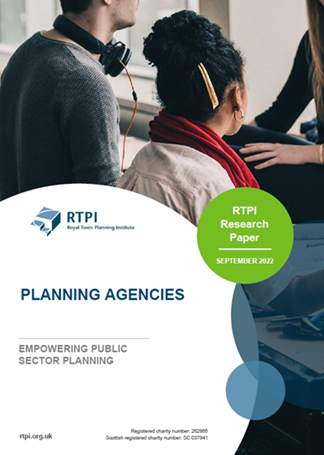 Politicians and councils have rising ambitions for planning delivery but services have faced significant budget cuts that have resulted in recruitment, skills and performance challenges for public sector planning.
Politicians and councils have rising ambitions for planning delivery but services have faced significant budget cuts that have resulted in recruitment, skills and performance challenges for public sector planning.
This research considers ways that planners and councillors can create more resilient and effective planning services.
The RTPI are responding to updated findings that:
- Local Authority net expenditure on planning has fallen by 43%, from £844m in 2009/10 to £480m in 2020/21. This amounts to just 0.45% of local government budgets allocated to planning services.
- Public spending on planning fallen the most – by 62% - in the North East of England. But other regions have faced similar declines: Yorkshire and The Humber (49%), London (48%), West Midlands (47%) and North West (46%).
- Planning fees are an important source of income for the public sector but proposed rate increases are vulnerable to inflation and could be lost in real terms when introduced in 2024
However, it is clear that sufficient funding alone cannot clear backlogs in applications and redesign planning services to meet resident’s needs:
- Less than half (49%) of planning applications were decided within statutory time limits in 2021 – continuing a downwards trend since 2010
- Only 8% of job postings for “Town Planning Officers” published between 2016 and 2021 were for public sector roles
This report adds to a growing body of evidence, including testimony collected by the 50 Shades of Planning Podcast, that shows how planning authorities are facing a morale and resourcing crisis that is already having knock on effects on the organisations and the system as a whole.
Planning Agencies
In consultation with our members, RTPI has developed a model for public sector improvement to better develop planning skills, respond effectively to local leaders and the community’s needs, develop expertise and local knowledge and underpin place-based action.
Planning Agencies are a voluntary, shared services model that local planning authorities can use to do more with less.
The agencies could share responsibility for standard planning services across local planning authority boundaries (including enforcement, development management, research and policy) to pool resources, add capacity and offer multi-disciplinary support that communities need to shape places and tackle inequality and climate change.
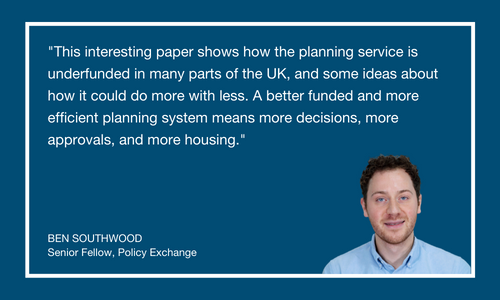
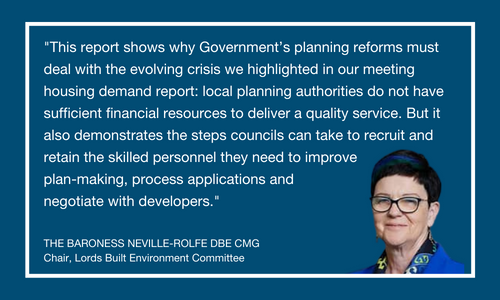
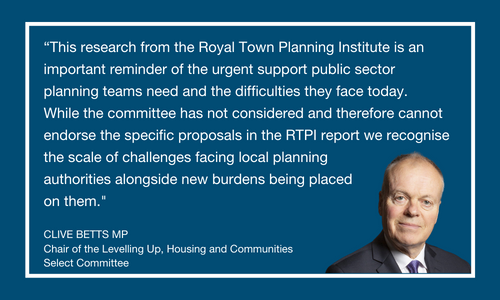
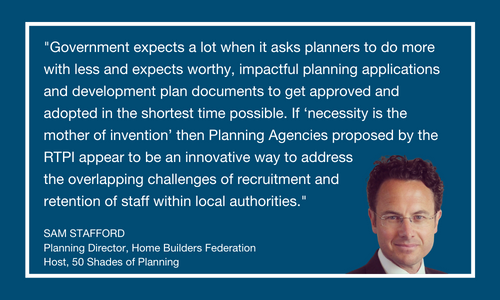
How could Planning Agencies work in the UK?
This report showcases promising evidence that collaborative, shared service models could also be applicable in the UK.
Through interviews, we engaged RTPI members and planners in other countries to explore alternative models for planning service delivery, including:
How would Planning Agencies help communities?
Planning is one of the most important strategic and decision-making functions that local authorities have to improve resident’s lives. Without better quality planning services, communities will miss opportunities to level up, deliver vital housing and tackle climate change.
We expect that Planning Agencies would:
Develop planning skills and professionals: they’d be prestigious, reaching a wider pool of talent and facilitating career growth with opportunities for development and mentorship. Their multidisciplinary approach would also help to recognise and support less visible disciplines of planning under a larger umbrella
Develop expertise and local knowledge: they would commission research, hold and use local data, deliver greater technical and specialist knowledge and generate added value from geospatial data and environmental assessments
Respond effectively to leaders and the community’s needs: they’d maintain accountability, operating under the most appropriate governance structures for their area and could be given strong leadership through a Chief Planning Officer. They’d also encourage collaborative responses to local challenges. interact with residents, business and community groups and build resilient networks and relationships.
Underpin place-based action: they’d maximise and share resources more equitably and help to address key challenges like socio-economic inequality, adapting to and mitigating the impacts of climate change and delivering the infrastructure needed to make developments more sustainable for new and existing residents. They could develop interventions at scale and take a holistic, solutions-focused approach.
What can government, councillors and planners do to help strengthen planning services?
For Councillors, Chief Executives and Elected Mayors
We recommend that you consider the challenges facing local planning services in your area and explore how a shared service model could benefit your residents and your local planning authority.
Download this short briefing which explains how Planning Agencies could help to tackle the recruitment and performance issues in your planning service.
For Planners
We recommend professionals to promote the core principles of collaboration and cooperation and embrace best practice on mentoring and personal development to create an environment where every planner can thrive.
We’re also calling on planners to help us map positive examples of co-ordination happening between neighbouring councils in the UK.
For Government
The government should act as an enabler for Planning Agencies and other forms of collaborative planning.
More effective and efficient planning can help to save both time and money whilst also helping to create greener, healthier and more prosperous communities.





